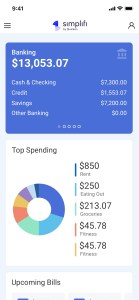Five and a half years after being acquired by a private equity firm, personal finance software company Quicken is announcing that it is being acquired by another private equity firm.
In April 2016, an affiliate of H.I.G. Capital acquired Quicken from Intuit Inc. for an undisclosed amount. Today, Menlo Park, California-based Quicken is announcing that Aquiline Capital Partners will be acquiring a majority stake in the company — also for an undisclosed amount.
In an exclusive interview with TechCrunch, Quicken CEO Eric Dunn did share some other details about Quicken’s performance since that last transaction, as well as its plans for the future. Dunn has a history with the company, so can speak pretty comfortably about where it’s been, and where it’s going.
While he took over as CEO of Quicken in 2016, he first joined previous parent company Intuit as employee No. 4 in 1986 when Quicken was its only software product. During his tenure at Intuit, he served as the CFO through the 1993 IPO and merger with ChipSoft (now known as TurboTax). While he was CFO, Dunn was also a software developer who worked on almost all of the early versions of Quicken, and was the first VP/general manager of the business.
Since the H.I.G. buy, it appears that Quicken has grown quite a lot. It currently has 2 million active users, which Dunn said is “significantly higher” than what it had at the time of its spinoff from Intuit. The executive declined to reveal hard revenue figures but he did share that the company is profitable and has seen a 50% increase in annual sales volume over the five-year period, (or double-digit growth if you annualize it).
“We’re strongly profitable and have been consistently profitable since the time of the spinoff. We’re a very successful company, revenue-wise — far above what it ever was in the Intuit years,” he told TechCrunch. “More importantly, we’re a successful business that has succeeded in modernizing and improving quality for our customers.”
For example, according to Dunn, Quicken has seen an NPS gain of 25 points over a five-year period. (NPS stands for Net Promoter Score, a customer loyalty and satisfaction measurement).
H.I.G., Dunn added, invested alongside the Quicken management team to improve product quality, bring Quicken to a cloud platform and launch a digitally native product in its personal finance app, Simplifi.
Image Credits: Quicken
“H.I.G. is not a growth-oriented expansion firm. They felt their work was done, and they did what they had set out to do,” Dunn said, “which is to carve out an asset with a lot of potential from a parent company which had neglected it.”
Justin Reyna, managing director at H.I.G. Capital, said the results of its investment in Quicken have been “outstanding.”
In recent years, the number of financial technology companies (and potential competitors to Quicken) has exploded. But, Dunn maintains, Quicken in fact was “the first fintech.”
“It was one of the founding fintechs, the only software product at Intuit when it launched in 1983,” he told TechCrunch. “It started with the idea of automating personal finances to customers as a software tool living only on desktops.”
Moving forward, Dunn said Quicken plans to explore partnering with fintechs as it continues to evolve its model. It’s not ruling out acquisitions, but it’s also not an area of emphasis.
No layoffs are planned with the new ownership. In fact, Dunn expects the company will only continue to hire and add to its 150-person staff (not including 250 contracted “customer care agents).
He said the company will simply focus on continuing the modernization of its Quicken product and bringing more functionality to its web and mobile offerings.
“We’ll also continue to add to our Simplifi product, which is only about 18 months into its life,” he said. “It has a great feature set but there’s lots more we need to do.”
It will also focus on integrated financial services, such as allowing for money movement from account to account in the product as opposed to going to an external site.
Aquiline is a New York- and London-based private investment firm with $6.9 billion in assets under management. Its president, Vincenzo La Ruffa, says he is a Quicken user himself.
“Quicken is trusted by millions of customers, who rely on it to lead healthy financial lives,” he said in a written statement. “As a longtime Quicken user myself, I’ve seen firsthand the work Eric and the team at Quicken have put into building a compelling suite of products and services. I am confident in the growth trajectory ahead as we work with the company to expand the range of innovative solutions it offers in the personal financial management space.”
There has been a flurry of interest in fintechs focused on personal finance as of late. For example, in June, personal finance startup Truebill raised a $45 million Series D funding round led by Accel.
